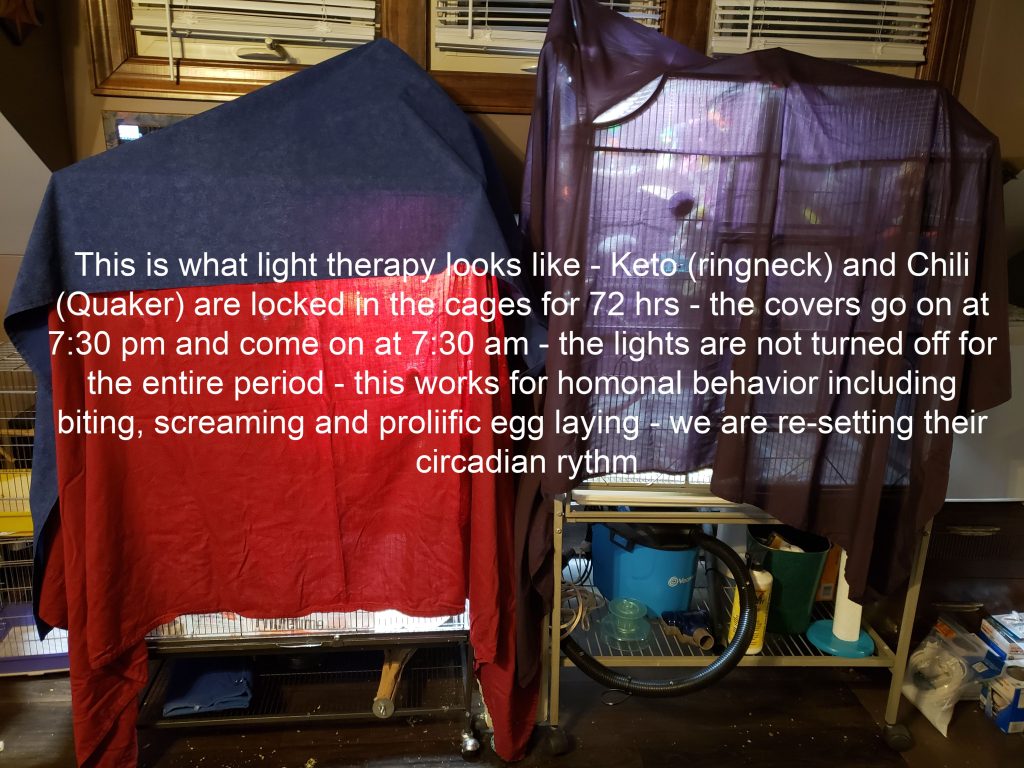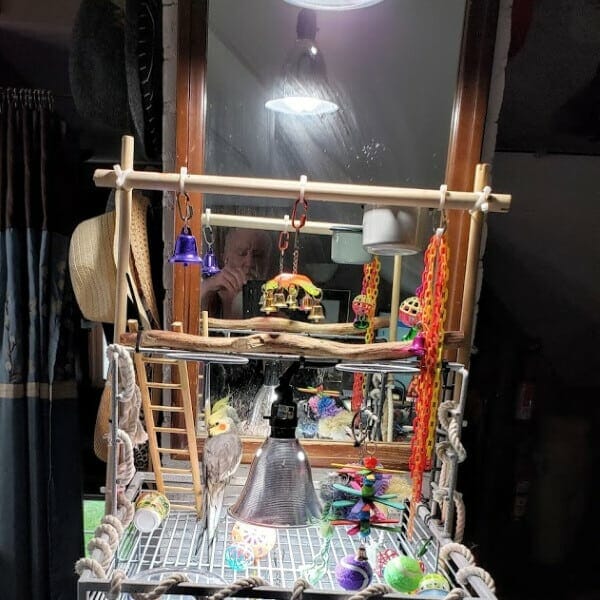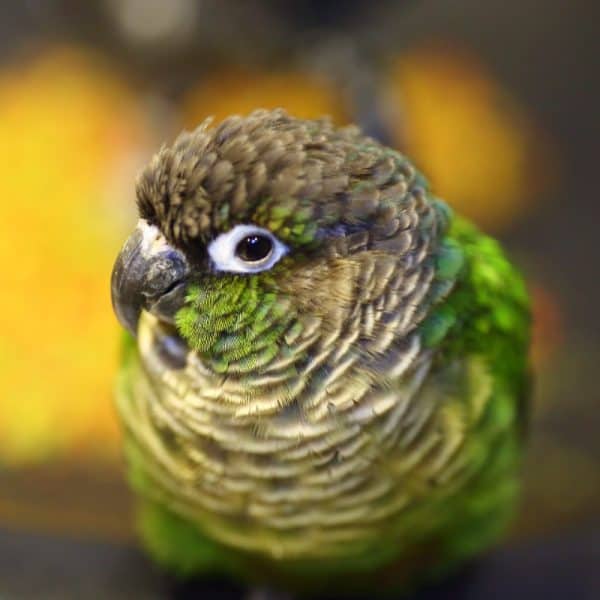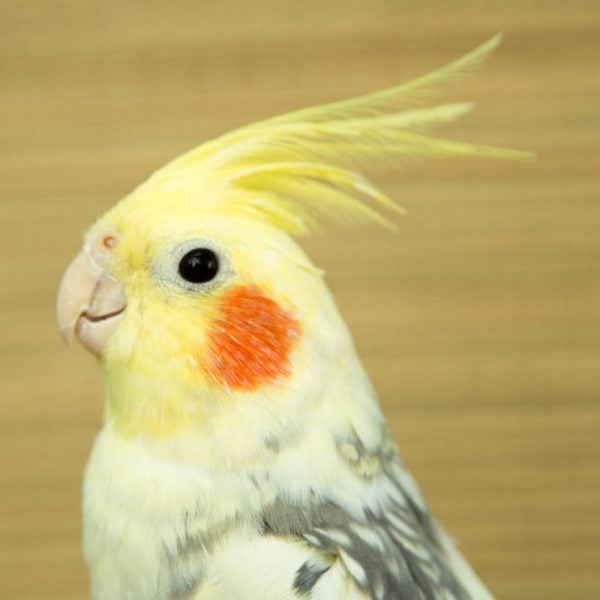Last Updated on by Mitch Rezman
This thread took place during the entire month of December 2020.
Spoiler alert (also found at end of the post)
Hi Catherine I don’t know if you got my email from the other day about the lighting treatment for Reggie’s hormones.
It did the trick.
She is so much friendlier to Kiwi there was just one time she went at him when he was on his stand but it wasn’t as bad as it was before the lighting treatment.
I know you are probably so busy I just wanted to know if she starts to show aggressive behavior do we do the 72 hr or 7 days she is still a little hormonal but not nearly as bad she loves going under my blanket lol.
Thanks again for your advice it was the best Christmas present we could have asked for.
️
Begin thread
Lisa N. has a conundrum:
Good morning our 7 yr old GCC (Green Cheek Conure) has all of a sudden started attacking our 7-month-old Pineapple (Green Cheek) Conure.
They used to get along so well preening each other sitting with each other on our ropes that we have hanging around the house they never went into each other cages and respected their space.
Now for the past 3 weeks any time our PC is out of his cage, she will sometimes attack him.
We know she is hormonal but will they ever be friends?
We don’t want to give our PC away, he is part of our family but if one is out of the cage the other has to stay in their cage.
Please tell me how or what we can do to bring our babies back together.
Dear Lisa
Yes, it sounds like hormones. Is the older bird the female?
You have provided the parts for a perfect storm and now have to deal with the results.
You have a female in the prime of her life and introduced a new male into her life.
He was likely still considered a baby and thus sexless when you brought him home.
Now over time, he is showing himself to her as a strapping young lad worthy of being a partner to her.
But he is really still too young to be ready to settle down with a mate and is not responding to her attention so she is getting cranky and letting him know how inadequate he is in hopes of goading him into being a little more responsive.
Over time he will mature and they will bond and mate and if provided with a nest box, may lay eggs and raise a family.
They are not ready yet, but they are in close enough proximity to have this all work against a happy home.
What is the rush?
I recommend that you try to regulate their hormones, hers for sure with a simple light setup.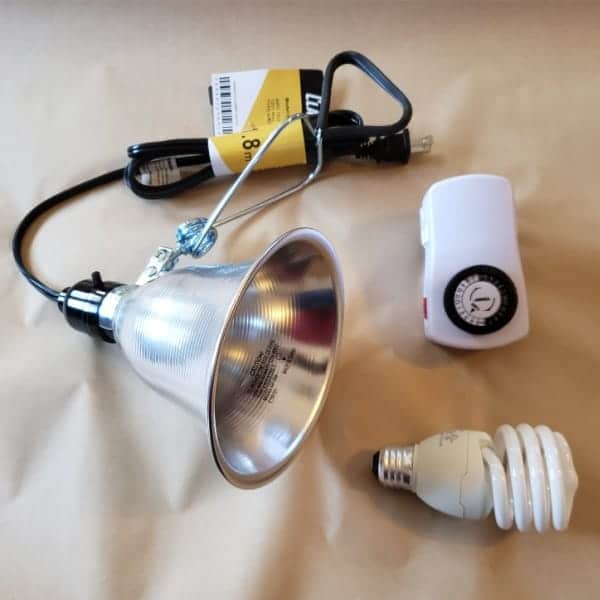 Full Spectrum Economy Daylight Bulb with Clamp Light & Timer
Full Spectrum Economy Daylight Bulb with Clamp Light & Timer
Use your choice of lighting fixtures from us or your own devices and good daylight or full-spectrum bulb mounted as close to the top of the bird’s cage(s) or play area as possible.
Set the timer for 12 hours on and 12 hours off year-round this will keep their hormone levels down and she, won’t be so revved up wanting a mate.
They can enjoy life as birdie buddies playing in the summer sun.
If she is highly hormonal now and is acting crabby, broody, building a nest, biting, or worse, laying eggs, then you can give her a 72 hour light treatment to reset her circadian rhythm using the same lighting set up.
You would instead of having the light on the timer for 12 hours on and 12 hours off.
Keep the lights on for 72 hours straight with her in the cage under the light the whole time.
Be sure to remove all huts, beds before starting treatment.
She may be confused for a day, but within 24 hours she will abandon nesting behavior.
It is not harmful, she would eat and sleep at odd hours and even call out.
After 72 hours go back to normal 12 hours on and 12 hours off on the timer and she should stop being so hormonal and relax and become a silly, friendly little bird again not ruled by her hormones.
You can also treat him to the same 72 hour light treatment if it is easier with your cage set up, it can help males too.
But at his young age, he is likely not hormonal yet.
Also realize, that you have a boy and a girl of the same species and they will end up choosing each other over you.
Is that what you want?
You will likely lose most of any bond you may have had with the female and in time you will be their keepers mainly.
Are you prepared to give them a nest box and the space and privacy for raising a family?
Do you have the resources to get another cage for their new family, would you sell or give away or plan to keep them, and then what are your plans to keep them from inbreeding?
It goes on.
I hope some of this is useful and food for thought. Please let me know more to help me help you further.
Catherine
Lisa N. replied
I will be getting the lighting on your site and yes our GCC Reggie is a girl and had eggs 2 years ago so we took her box out it was our vet’s advice and our new Pineapple Conure is a male and we don’t want to breed them but hopefully, with the lighting and as he gets older they will become friends again.
We do give them the same amount of attention but in separate rooms so the other doesn’t get jealous, I will keep you up to date on the results of the lighting which I think should work.
Thank you so much for your advice.
Dear Lisa
Terrific, glad we can help with the fids. The lighting should help for now.
Yes, over time, maturity will help with the aggression but they also may fall in birdie love.
That isn’t a bad thing, we all want someone to love.
It is understood that sometimes fighting mother nature is difficult and will help a lot in seeing what it will take to house them both and still enjoy them.
Please, let us know if you see any improvements in the days after the light treatment. Because you have a male around, you may need to repeat the treatment in a few months if she resumes her hormonal behavior.
In separate rooms, they can still hear each other and will be stimulated by the calls.
Regards,
Catherine
Lisa N. replied
Hi Catherine I ordered the light for my GCC because she is so hormonal and it was delivered yesterday.
My question is “When it’s on for the 12 hours how long should she be in her cage?
She loves flying around and playing with her toys outside the cage she only goes in to eat or to relax for a little while.
Should we keep her in there for a while even though she will scream we want this to help so she can be friends with our Pineapple Conure again?
I would love to hear what to do. Thank you so much have a good day.
Dear Lisa
You may find that once you install the light on your bird’s cage that she will want to spend more time there basking under the light.
Birds are attracted to the brighter areas.
When you first set it up it may seem overly bright to both of you, but within a few hours, all will seem normal.
You are replicating the sun for your bird.
If you have a play stand for her that she spends a lot of time on, then you may want to add another light there.
The same light you ordered, if you remove the clamp it acts like swag and can be hung from a hook above as well.
Lisa responded:
Thanks, she seems to not like it so far so we hope she gets used to it.
She tries to hide from the bright light.
She would rather be out of her cage than in it.
She’s been the only bird in the house for 3 years so she pretty much comes and goes as she pleases.
Should we put her in the cage for a while so she can get used to it or let her go in when she wants?
From Catherine
No, right off the bat, she won’t like it, but over the next day or so, it will become the new normal.
We live under a bright sun, we know better than to look straight up into it, so will she. Right now, it is something new.
Do you lock her up when you go out of the house for her protection?
That would be a good time to start to get her used to it and you don’t have to sit and look at her as she tries to get out or call out to you.
If she spends most of the day out of the cage with you at home, then unless you plan to give her a light treatment, you don’t HAVE to lock her up there now.
She will go back and eat, right?
So over time, she will get used to it.
If you feel a lot of her behavior is hormone-related then now is as good a time as any to get her started on the 72-hour treatment.
By the end of the three days, she will be used to the light then being left on during the daytimes.
Yes, it is bright at our house, but the birds are so much better for it.
From Lisa:
We do lock up our birds when we leave and when we come home she screams “hey out” until we let her out.
But thanks for the advice.
She’s not bad with her hormones.
She just doesn’t like our Pineapple GC conure right now and you said that’s because he’s so young but she doesn’t bite us and she likes just sitting in her cage or on top just looking out the window.
We were just worried because she laid eggs 2 years ago that’s how we found out she was a girl so we don’t want her to go through that again.
Thank you again for your advice sorry to have bothered you with all these questions.
I will send pictures and let you know how things are going.
Dear Lisa
Good to hear they are locked up when you are away.
Yes, it may still help if she gets the 72 hour light treatment.
You said that you currently already have to keep one locked when the other is out anyway.
Yes, please we would love an update, figure 30 days and you may notice that changes have taken place.
From Lisa:
Here’s a pic of her cage with the light she sleeps on top of the seagrass bridge or under the bandanas on the three shelves.
From Catherine
Lisa
The arrangement is very creative and pretty, but it isn’t normal for any bird.
For this, to work you have to get rid of the bedding. It cannot have dark areas in her cage. Your bird will always suffer from the hormonal activity and it can lead to chronic egg laying down the line.
If you want her mood to be lighter, then you will have to make changes to the cage.
No bedding, no dark places she can hide in.
She should be provided with a number of perches in different materials and sizes.
I recommend a 14″ Booda Comfy perch (either medium or small in diameter) placed across an upper rear corner and she will sleep there.
Then assorted perches below it around the cage.
I like the perches you have in it now, but you can also clip one end of the long one higher and let it be on an angle giving her a route to travel downward.
A small pedicure perch placed near the food dishes or the front of the cage, med level or low will help with sharp nail tips and beak control.
I just took a short video of our three boys in their cages this morning.
Chili making a racket with our two other boys in the morning.
I hope this helps.
From Lisa:
Thanks, I will try that I know she won’t be happy about losing her bandanas
She does sleep under them at night can I keep the seagrass ladder that goes from one end to the other she may just sleep on that.
From Catherine
I recommend that you reduce the area shaded in the cage by the seagrass ladder as much as possible.
You can hang the seagrass ladder on the side of the cage, then bend up part of the bottom to give her a shelf to sleep on (secure it to the cage bars to hold the shape as best you can with ties, etc.)
I would reduce the bandanas to one, clipped to the side by her bed, but not long enough to fully snuggle under or cover her up.
From Lisa
Ok I will do all that right now and get another booda rope for her and I have a lot of wood perches.
Again thank you so much for your help I’ll let you know how it goes.
From Lisa
I just changed it.
You’re right taking things out made a difference and is the soft rope perch on the top in a good place?
From Catherine
Looks great!
I love it!
From Lisa
Oh, good thanks sooooo much she’s in there now because we are eating lunch and she seems to be ok with it.
Thank you for all your advice.
Have a wonderful day!
From Catherine
Glad to hear it!
We do tend to overthink things.
Hope to see some improvement over time.
By the way, the bulb is not aiming down fully, it can be annoying, so if you can’t devise a way for it to aim straight down, then you may want to turn it so it shines more toward the wall and not your eyes.
From Lisa
Where we sit it doesn’t bother our eyes at all
Lisa wrote:
Last night was not a good night we left the light on covered her and the light with a sheet at 8:30 pm and we stayed up till 9:30 then went into our bedroom to watch TV.
Well, about 1 hr later Reggie started yelling and saying “hey”, she says that to get our attention, we ignored it and later went to sleep (well tried) there were small moments of quiet but she would start up again at 3 am I went to see her and she was wide awake at 5:30 I felt so bad I just shut the light off so maybe she can sleep for a few hours.
I know that was wrong but like a mother with a baby you don’t want to hear your bird is not sleeping I don’t know if that’s normal or should we just stick to the 12 hrs first as she still won’t go in her cage if the light is on she is very stubborn. Please let me know what to do next.
Hi Lisa,
Yes, you have to leave the light on for the full 72 hours if you want it to work.
She will also nap at odd hours, she might stay up much of the first day but soon will need some sleep.
It isn’t so loud for a small bird.
You may wish to keep her in a separate room at night so she doesn’t keep you up.
GCC’s are obstinate, they are conures. Who is the boss in your house?
(The balls and round toys did have to go away totally, as they can be stimulating).
Now if you feel you can handle the hormonal behavior she is exhibiting now, and that she is not laying eggs so you can live with it? Then give up the treatment. But still do the 12 hours on and 12 hours off daily.
Further, like humans need a recommended 8 hours of sleep a night, we don’t always get it.
MitchR here:No one likes to have a child in the hospital.Children in a scary hospital will cry and scream but removing them will solve nothing.
Birds are noisy especially when a routine is changed.
Watching this, Barney the cockatiel who usually is silent all evening starts to vocally fume, and begins pacing the cage floor until I drop in a 1-inch piece millet sprig.
End Wikipedia
Catherine continues:Birds will never sleep a full 12 hours at night, but they rest as well.
If they don’t get the full 12 hours of sun a day which resembles summer when no birds chose mates, lay eggs, etc, then they will always be feeling the “urges”.
Goading him perhaps. Once he ages he may be able to stand up for himself better and she will change her tune, hopefully. You can’t force them to be friends, but you can try. Just be there to break it up if needed.
Let me know.
After the 72 hour period. Do the 12 hours on and 12 hours off forever. Replace the bulb yearly.
This is to keep her hormone level.
One week later
Good Monday morning Catherine I hope you had a good weekend I was really surprised to see that you put my lighting problem as one of your articles.
But the 72 hrs ended yesterday and now we are doing the 12 hrs on 12 hrs off but she still won’t go in her cage to eat unless we put her in there or I turn the light off until she’s in there.
This morning I was cleaning our Pineapple’s cage and he was on my shoulder and she was with my husband in the kitchen all of a sudden she flew over and attacked our Kiwi I had to catch him or he would have fallen what should be my next step or should we just be patient with her or do the 72 hr. again Thanks.
Dear Lisa
Consider getting a light for his cage too. Not that it is the plan, but if she doesn’t like it on her cage, perhaps she also won’t like it on his cage and leave him alone some.
Your GCC is quite headstrong. Some are just feistier than others. The male should get better at defending himself as he matures.
But he still might let him buffalo her. We can’t always have birds (or children) that get along perfectly.
You said that if you had not retrieved the boy or he would have fallen. Is he clipped and she isn’t? That can be a problem if he can’t get away.
You may have to clip her wings for one season to keep her grounded and allow him to get more confident. By the time her wings molt and grow the flights back in, the ground may be more even.
We have always had to clip the wings of new rescues so they learn their own cages, the stands, and how to get along. Once they have grown back in, they know where everything is.
We have a rescue quaker named Chili who is quite a handful and always wants to jump onto the cage that belongs to Keto, our African Ringneck. Chili mainly just wants to go into Keto’s cage and eat his food, and ring his bells, but sometimes he will charge Keto which makes Keto fly off and cry to us.
3 months of inability to fly after clipping didn’t seem to help as much as we would like and he ends up spending an hour here and an hour there locked in his cage (with lots of food and toys of course) cooling his jets.
Lately, I have found though that as a result of my spending more time with him, carrying him around the whole house with me when I work, visiting the budgies, sitting on a chair watching while I make their morning veggies, etc. That when he does go back to his cage, he is a little worn out and is happier to just hang out and not run and bother Keto as much. So, consider more exercise and busy time together.
Oh yes, our customer’s experiences help us and others. We are happy to have your story as a part of it all.
Lisa replied,
Dear Lisa
Hopefully, it is nothing serious.
They are free flighted, but do you have them in the room you are in, or do they just go off and do their own thing?
Just like children, you wouldn’t let a two-year-old run off into another part of the house without going after him to stay with him or bring him back by you. It is the same with our birds.We have a young parakeet my husband wanted to try to have as a tame bird, but the budgie was just driven to hang out with the cockatiel and he bit him twice. Once removing a toe and after the second bite, we had to give it up and let the baby keet go live with the rest of the older keets in the aviary and he is fine now. We have to protect our birds and do the best we can for them, even if it isn’t what we had planned from the start.
Since you are taking him to the vet, perhaps if your husband doesn’t want to be the one to clip the girl, maybe they could do it at the vet’s office?
Let me know how it goes.
In answer to your question
They will then realize they “need” you and will waddle over to you or your hands to pick them up and carry them around.
This is used very well for attitude adjustment as well. During this time it is good to show them new stands to sit on. Flighted birds are harder to get accustomed to new stands because they won’t always stay where they are put, but a clipped bird pretty much has to stay where they are put.
You don’t have to clip heavily, just try a bit, evenly on both wings, see how it slows her down. If not enough, then clip a little more. She should be able to flutter downward on an angle, not drop like a rock.
And yes, you will have to know where she is at all times, you don’t want to step on her if she spends time on the floor.
Lisa, getting back to lighting,
That is 12 hours light on and 12 hours light off. There are 24 hours in a day. Figure 7:30 am to 7:30 pm on.
Yes, make things even at home for the birds and it may be easier for her to adjust to the light. It is only mental, nothing more.
The light is natural for them, that she hasn’t had it before is the only issue. She will adjust.
Your husband can pick her up and carry her around and even put her up on the ropes. It may actually help them bond a little more due to her needing help to reach them.
I fully understand your husband’s feelings.
We had to do it for all of our rescues (other than the budgies in their large aviary) so they would have to take the time to settle into their new surroundings, learn where their own cages were, the stands, etc.
But past that, they won’t get clipped again.
Lisa replied
So just trim a little bit and see how she does now that she is on the 8hrs on 8hrs off can she come out of the cage a little more than when she was on the 72 hr.
And I think it’s a great idea to get a light for Kiwi because when they are both out and he’s with one of us she flies right to his cage and goes in and eats his food and even will try to knock of our PCC when he’s sitting on the door.
I will try to talk my husband into trimming her wings he really loves how she flies around and follows us and hangs out on her ropes that are really high up like in the kitchen and my bathroom so I hope I can change his mind we are so used to her flying around if he doesn’t want to will it be a big deal
He said he will trim them a little she is still very close to him but now we have to take our Pineapple Conure to the vet he was sitting on my shoulder and when I went into the bathroom there was blood all over my shoulder his front right claw looks like the joint is hurt and the nail is bleeding but I put the powder on it and it is fine he’s sitting on my husband’s stomach and we go see the vet at 3:30 I’m so worried he hasn’t shown say distress but I know birds do that so I hope it’s nothing serious. I did order a light for his cage.
She is free flighted but he will fly off his cage onto the floor the run or hop but no he doesn’t fly around the place we bought him from clipped his wings so they are slowly growing back but he’s not she flying off the rope in the kitchen so we have a large carpet when he does done doesn’t hit the tile and no I don’t think Reggie did it had a sea grass bridge in his cage like Reggie has maybe he caught his toe on it so I took it out and both have new ropes in there cages.
When we are doing the 12 on 12 off can she came out of her cage more then when she was doing it he 72 hr.
Ok, thanks for the info. Lisa.
His being clipped, and her not clipped is a disadvantage to him.
The soft clip for her may help even the playing field.
Good morning Catherine,
I just wanted to let you know our Kiwi is ok apparently he got his toenail stuck on something at some time and over the course of a few days he was chewing at it and more of the nail broke but we saw him doing it and he walked and climbed with no problem until yesterday when he started bleeding so the vet colorized it and now he has to be in his cage for 24 hrs and we can’t handle him just so he can relax and heal so by 5 today it will be up and we can take him out. And Reggie is getting better at going in and out of her cage with the light on.
Oh and I forgot to tell you we can’t clip her wings her previous owner gave her seeds for 5 yrs until we got her now since last spring she gets these sneezing jags that last for a minute or two so the vet found out her one nasel passage doesn’t have I think it’s called nodes that are supposed to keep stuff from getting stuck in there so when it starts she has to take drops in her nose to clear it up and she likes going on the carpet and rub her nose in it or try to hide under the couch so if we trim her wings she will be digging in the carpet unless we hang on her all day.
The vet agrees with the lighting but trimming her wings would not be good. Once we get the light for Kiwi can he come in and out during the day like Reggie does?
Thanks for your concern.
Dear Lisa
Glad Kiwi is okay. Please don’t go by the clock when letting him back out. 24 hours isn’t very long. When our new keet was bit by the cockatiel, we made him stay in his cage for 2 days to make sure it not only clotted well but was healing before we let him back out. It was for our comfort more than his. The cauterization he had was painful and his foot is still in pain. Letting him out too soon will only cause him pain every time he moves around (or gets chased by Reggie). Let him rest another day, it will be better.
Interesting about the sneezing issue, etc Reggie has. I don’t see the relation between a seed diet and the nasal problem. We will look that one up for our own information. Always best to be informed in every way.
I don’t see how it has anything to do with her wings not getting to be clipped. I would just treat her nostrils with the drops and keep her in her cage until the urges to wipe herself all over the carpet have passed. But you have to do what works for you. You just have to continue with your dealings with the bird flying around after Kiwi.
Glad the vet understands about the lighting and that Reggie is adjusting. The new lamp has shipped and once installed on Kiwi’s cage, it should be helpful there too.
Please keep me up to date on any progress.
Good morning Catherine,
I know you are so busy with other clients we just found out my son isn’t bringing his Parakeet’s over for the week his conference was canceled till next year so we thought this would be the perfect time to do the 72 hr treatment starting tomorrow since it’s so late in the morning.
I did put the light in Kiwi s cage and put it on top of hers and it does make a difference i will order a new light for him.
The picture is with the blinds closed then the other one is when they are open which is better for her during the 72 hr.
And this time she will not come out of her cage I read that this morning in the newsletter.
I hope I’m doing the right thing.
They look great!
The cage with the TWO lights is very nice.
Looks like she is getting used to it well, you clearly have it under control.
I’m glad you think the cage looks good one light just didn’t make it bright enough so at 8:30 this morning she started her 72 hr treatment but it’s been strange the last 4 nights around 6 Dennis is usually got Kiwi in his stomach and stroking the back of his neck since he can’t do that with Reggie anymore because she picked him as her mate 2 years ago anyways all of a sudden Reggie will come over sit next to Kiwi and they preen each other for about 20 minutes then she leaves but only at night it’s sweet to see that but we know she is still very hormonal she’s been doing a lot of masturbating in her cage so I hope this will help her.
I did get a light for Kiwi he loves it and looks around for his but it’s on her cage I also got 2 wood ladders for Kiwi .
Thanks again for everything I’ll let you know how she does after Thursday when she’s done.
Sounds like you are handling this well.
Keep me in the loop.
Catherine
Hi Catherine I don’t know if you got my email from the other day about the lighting treatment for Reggie’s hormones it did the trick she is so much friendlier to Kiwi there was just one time she went at him when he was on his stand but it wasn’t as bad as it was before the lighting treatment I know you are probably so busy I just wanted to know if she starts to show aggressive behavior do we do the 72 hr or 7 days she is still a little hormonal but not nearly as bad she loves going under my blanket lol.
Thanks again for your advice it was the best Christmas present we could have asked for.️
Lisa, Great news.
Keep on top of it. No more under the blankets, sorry. Find other things to entertain her.
Please let me know how it goes.
Author Profile
Latest entries
 The Traveling BirdJune 26, 2025Can You Name 5 Parrot Species That Are Living Wild in the USA?
The Traveling BirdJune 26, 2025Can You Name 5 Parrot Species That Are Living Wild in the USA? Bird BehaviorJune 26, 2025How is it Parrots Are Problem Solvers Social Animals and Even Use Tools?
Bird BehaviorJune 26, 2025How is it Parrots Are Problem Solvers Social Animals and Even Use Tools?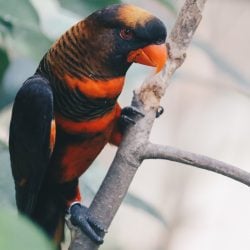 Bird & Parrot AnatomyJune 25, 2025How a Tiny Chemical Modification Makes Parrots Nature’s Living Paintings
Bird & Parrot AnatomyJune 25, 2025How a Tiny Chemical Modification Makes Parrots Nature’s Living Paintings PigeonsJune 20, 2025How Do Parrots Thrive in Cities Outside Their Native Habitats?
PigeonsJune 20, 2025How Do Parrots Thrive in Cities Outside Their Native Habitats?

